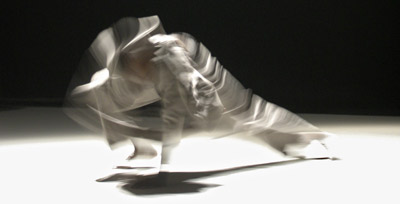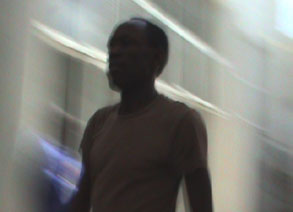
Opiyo
Okach
Maintaining his place on the international contemporary dance
scene Opiyo Okach divides his time & develops work between France
and Kenya. Through a long term choreographic development initiative Okach
has acted as a catalyst for a new depth of intellectual reflection and
encouraged the development of new perspectives and vocabularies in dance
from east africa. Having received the ‘prix du Nouveau Talent Chorégraphiques
SACD 2003’ Okach was recently awarded a ‘Prince Claus Award
for Culture and Development 2005’.
Artistic director of the first contemporary dance company in Kenya Opiyo
Okach remains the principle figure of the choreographic landscape of the
country. The
prize at the second Rencontres Chorégraphiques Africaines 1998,
for the company's first work - Cleansing, places him amongst
the pioneers of a new generation of choreographers from Africa.
Trained
at the Desmond Jones School of Mime and Physical Theatre in London Opiyo
Okach integrates dance in his work on his return to Kenya in 1995 and
following research on traditional ritual and performance. During the same
period he encounters the choreographers Alphonse Tiérou, Irène
Tassembedo and Germaine Acogny.
In
I996 Opiyo joins Faustin Linyekula and Afrah Tenambergen to form the first
contemporary dance company in Kenya, La Compagnie Gàara. With its
creation, Cleansing,
in which the mundane gesture of everyday cleaning gravitates towards violent
purification, the company wins a prize at the Rencontres Chorégraphiques
Africaines 1998.
For the company Cleansing opens the door to the international
scene (Montpellier Danse - France, MASA - Cote d’Ivoire, St Leu
Danse - Reunion...). It also marks the beginning of support by principle
figures of French dance such as Régine Chopinot or Mathilde Monnier.
From
1998 the Ballet Atlantique Régine Chopinot actively supports and
partners the group through a series of residencies and choreographic exchange.
Having encountered them during an African tour she invites the company
for a first residency at Ballet Atlantique.In 1999, she supports, in collaboration
with the Centre Chorégraphique de Montpellier, the company’s
new creation, Rituals of the Rock - inspired by the mythology of nomadic
ethnic groups in east africa, composed of the trio Kit Mikaye
and, notably, the solo Dilo
- for which Opiyo Okach would become known in Europe.
Between 2000 & 2002 Opiyo Okach lays the bases for a long time choreographic
development project in Nairobi - Générations 2001, with
the support of Ballet Atlantique Régine Chopinot, Association Française
d’Action Artistique, Maison Française de Nairobi, Ford Foundation
and the program Unesco-Aschberg Bursary for Culture. The project combines
dancer training, residency programs, research and choreographic creation.
It is also within this context of exchange that they experiment the duo
Borderlines with Régine Chopinot in December 2000.
In 2002, Abila,
a choreographic creation with video and electro-acoustic music emerges
from this project, nourished by collaboration between Kenyan artists of
different disciplines and exchange with two european composers and a video
artist. Premiered in nairobi and at Ballet Atlantique and Centre National
de la Danse in France, the creation is
presented in 11 countries in Eastern, Southern Africa and the Indian Ocean
region ( French Cultural Centres, MASA), Iles de Danse in France and several
European countries (Germany, Belgium and Italy).
Following its discovery at Plateaux de Biennale du Val-de-Marne 2001 and
its subsequent evolution at alternative Parisian scenes, the solo Dilo
is noticed at Festival Avignon 2002 at the Hivernales. Dilo is based on
improvisation and instant composition work, inspired by the mythology
of nomadic ethnic groups in eastern Africa. Since its creation the solo
has toured internationally to over 17 countries (France, Egypt, Italy,
Slovenia, Germany, Netherlands, Belgium, Switzerland, Guyana, Russia,
USA, Nigeria, Togo, Kenya, Burkina Faso, Senegal, Guinea...).
In
2003 the society of authors and dramatic composers (SACD) awards Opiyo
Okach the prix du Nouveau Talent Chorégraphique 2003.
In the framework of Vif du Sujet the SACD commissions him to create a
new solo for Festival d’Avignon 2003. His collaboration with Julyen
Hamilton, the renown improviser, gives birth to No
Man’s Gone Now an instant composition work. Inspite
of the cancellation of Festival Avignon 2003 and Festival Paris Quartier
d’Ete where the piece was to premier, No Man... premieres at Centre
National de la Danse in January 2004 and has since known international
success (Soirées Nomades of Fondation Quartier pour l’Art
Contemporain, Plateaux de la Biennale du Val-de-Marne, Aix en Provence,
Nouvelles Strasbourg Danse in France, Drei Wochen mit Pina Bausch in Düsseldorf
Germany, Fabbrica Europa in Italy, Fitheb in Benin, Festival of Dhow Countries
in Zanzibar, Godown Arts Centre Nairobi...).
2004 is rich in new transversal collaboration, notably with choreographer
Thierry Niang, hosted in residency in Nairobi. The project results in
the duo, Free
Figures, presented in France at Festival d’Uzes,
3 Bis Aix and Théâtres en Dracénie. It also marks
the beginning of collaboration with choreographer Emmanuel Grivet for
the duo, Accords
Perdus created at Regards du Cygne in Paris November
2004. Accords Perdus is subsequently presented at Centro Cultura de Matadero
(Huesca Spain), Dense Bamako Dance (Mali) and Pôle Sud (Nouvelles
Strasbourg Danse)...
Today
Opiyo Okach is artistic director of Gaara Dance Foundation - created in
2002 with the support of Ford Foundation to consolidate the choreographic
activity initiated in Kenya. Its activities include choreographic research,
artist residency, choreographic exchange, support for creation and diffusion
of work. Regional and pan African exchange such as the Dance Encounters
(East African Dance Encounters 2003, Retracing Connections 2004, Encoding
Identities 2005) initiated in 2003 are part of its mission.
The next international edition of the encounters are in 2007.

|
Minimal
dance and improvisation
From
Cleansing to Dilo Opiyo affirms a unique style distinct from other work
emanating from the continent at the time. Extremely bare, pure and minimal,
simplicity, sobriety and elegance of lines, language of the body combining
gravity and humour are the recurring key-phrases employed by the press
to evoke this dance which escapes all etiquette.
Improvisation
and instant composition work has increasingly become the privileged choreographic
tool; each performance a new version, in symbiosis with the moment and
place.
 read
the interview about his carreer read
the interview about his carreer
read the interview about his artistic project
Accueil
Libération
- 7 may 1998, Marie-Christine Vernay
Cleansing s’inspire d’un rituel funéraire kenyan
non pour en prendre la gestuelle ou la structure, mais pour en garder
l’esprit: celui du contrôle (…) La danse est extrêmement
délicate (…), respire ample, calme. Ni abstraite, ni
expressionniste, elle est très intime, circulant d’une
manière douce entre les trois danseurs aux crânes rases.
Pas d’effet superflu, pas d’excès dans le spectaculaire
(…) On pourrait penser parfois au butoh dans l’étirement
du temps, mais le spectacle, très zen, échappe à
toutes les étiquettes.
Libération - 13 january 2000, Marie-Christine Vernay
Inspired in its structure, rather than steps, by ritual, this bare
choreography, not afraid of slowness, evokes as much buto as minimal
dance.
Le
Monde - 30 july 2000, Jean Louis Perrier
As if it had suddenly accumulated enough light and heat to transform,
the sculpture becomes human, unfolding (…) Opiyo Okach takes
the space in his arms and cradles it. His elbows and shoulders under
shadows in the invention of a world without apparent violence.
|

|
